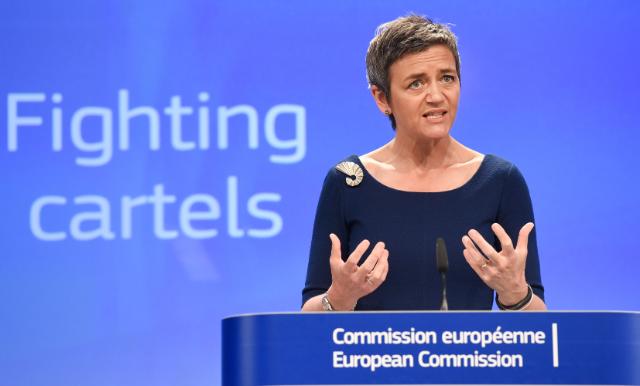
Margrethe Vestager is without a doubt the most popular European commissioner at the moment. The Dane heads the Directorate-General for Competition of the European Commission. She adjudicates on issues of market power, cartels and unfair competition. With a snap of her fingers, Vestager imposes billion dollar fines on the biggest corporations of our time.
Last week, for example, she imposed a fine of around 4.3 billion euros (approximately $5.1 billion) on Google for antitrust violations. The U.S. company has established a dominant position with its Android operating system for smartphones, which it abused in order to require phone retailers to install the Google search engine and browser on their devices. Vestager has previously taken on giants such as Apple and Amazon as well. Chip manufacturer Qualcomm received an enormous fine. Starbucks, Fiat and Gazprom are also under fire.
If you are ever asked to become a European commissioner, always try to get Vestager’s portfolio because the commissioner for competition has more power than all the other commissioners combined. She (or he) is prosecutor, judge and jury, and makes the largest and most powerful corporations tremble with fear. The public loves politicians with power. When Neelie Kroes led the Directorate-General, she was also incredibly popular. Our own iron lady dared to tackle Microsoft’s monopoly! Later, as the powerless commissioner for information and communication technologies, she was simply an unpopular Eurocrat once more.
Thus, it is presumably not the individual but rather the power of the position that puts this European commissioner so squarely in the limelight. The European Commission has the means to impact the position of the world’s biggest corporations, and that is striking. All the more so given that the United States, the traditional champion of free market competition and antitrust regulations, has been derelict in this duty for quite some time.
A century ago, U.S. market authorities dismantled the mighty Standard Oil. John D. Rockefeller’s oil company was broken up into 34 smaller companies. But the U.S. government does not seem to want to do anything about the equally dominant position of companies such as Google, Facebook, and Amazon today. That dirty work is left up to Europe.
Yet until recently, Europe was actually the continent where cartels, state intervention and other forms of market corruption operated as if it were business as usual. Businesses that sought shelter against the harsh wind of competition, that wanted to divide the market with their competitors, that wanted to seduce the government into giving them enormous subsidies, had to be in Europe, not the U.S. But those days now seem decidedly over.
Last month brought the publication of a study that shows that the EU, not the U.S., has become the guardian of fair market conditions. Thomas Philippon and German Gutierrez, two economists with the Stern School of Business in New York, published an article with the European Centre for Economic Policy Research titled, “How EU Markets Became More Competitive Than US Markets.” The researchers demonstrated that, in the European market, companies have less market power, excess profits are lower and there are lower regulatory barriers to entry for new businesses. Until the 1990s, the U.S. had been at the forefront in this arena.
Political affiliations are an important factor in explaining this shift. Whereas U.S. politics have come increasingly under the control of big business and its lobbyists, Europeans have become more attentive to the consumer. In the U.S., the number of lawsuits that the government has initiated against corporations that abuse their market power has decreased to nearly zero. In Europe, on the contrary, there have been more prosecutions. This shift can also be seen in the size of cartel fines; at the end of the last century, Americans imposed higher fines than Europeans. Today, Europe is at the forefront. By no means does this apply only to American companies. European firms have also received increasingly steep penalties for cartel practices over recent decades.
There has been a “startling reversal” over the last 20 years, Philippon and Gutierrez write. European, rather than American, politicians are now the world’s foremost defenders of fair competition. Vestager is not only Europe’s hero but also the world’s.
Editor’s note: This commentary was originally published last month, but the editors feel that its content remains relevant.

Leave a Reply
You must be logged in to post a comment.